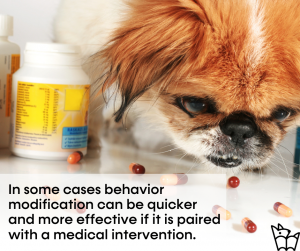Even though the stigma surrounding psychotropic meds for humans has decreased in the past decades, many dog owners are still afraid of pharmacotherapy. They worry that medication will change their dog’s personality, turn their companion into a “zombie”. Many still believe that medication is a last result, but actually in some cases behavior modification can be quicker and more effective if it is paired with a medical intervention.
When should we consider using medication?
It makes sense to consider including drugs when the dog:
- experiences a lot of fear, anxiety, and stress on a daily basis,
- recovers very slowly after stressful events (days/weeks instead of minutes/hours),
- does not respond to training: the condition either does not improve or even if one “problem” gets solved, another one pops up in its stead (for example the dog stops showing stereotypic behaviors but starts reacting aggressively to something).
What kinds of medication are out there?
There are two main medication groups:
- “Maintenance” medication which works long-term. It usually takes several weeks before its effect can be observed. It is used when the triggers are frequent and unpredictable (for example the dog is terrified of traffic and the owners live in the city center).
-
“Situational” medication which starts working within a couple of hours. It is used when the triggers are rather rare and predictable (for example vet visits, fireworks).
What is the goal of pharmacotherapy?
Medication is used so that the dog:
- is calmer and more balanced – the reactions to triggers are less intense and/or less frequent; everyday management is easier and more effective;
- learns better, responds faster to behavior modification protocols;
- feels better, because the underlying neurochemical imbalance is adressed;
- recovers faster after stressful events.
FREQUENTLY ASKED QUESTIONS
Will the medication “cure” behavior problems?
NO, it won’t. Medication is practically always applied together with behavior modification protocols. It’s very rare that medication itself is enough.
Will the dog have to take medication for the rest of their life?
Just like humans this is an individual matter. Some stay on medication long-term, some can discontinue meds after a while. The start and discontinuation of pharmacotherapy must always be supervised by a veterinarian!
Why is the dosage so high?
Compared to human dosages it often seems like dogs are getting an extremely high dose of medication, but their metabolism is just much faster than ours – the active substance leaves their system much faster. Therefore, they need a higher dosage compared to the human one.
ATTENTION
- Medication can only be prescribed by a veterinarian!
- Pharmacotherapy requires regular check-ups!
- Since animals can’t tell us how they are doing, finding and maintaining appropriate medication regimen can be tricky. The owner must watch their dog’s behavior closely!
Gomba is a charming dog with a lot of issues. Her owners first reached out to me because she was showing some concerning behaviors around guests. Unfortunately, over the following weeks we discovered that this was the least of her problems.
Gomba’s situation is an example of a perfect storm. She:
- came from an impoverished environment
- probably did not come in contact with people during the socialization period
- might have a genetic predisposition (her mother was chained because she bit someone)
- faced a host of medical issues (prolonged ear infection as a puppy, pseudopregnancy followed by an early spaying, allergies…)
- fell victim to aversive training (alpha roll, flooding, corrections)
Her owners are some of the most dedicated people I know but it soon became clear that the issue was not the type or quantity of training we were doing.
We encountered all the signs that medication is necessary that I mentioned above:
- Progress was slow and often as soon as we improved one problem, another one popped up (for example loose leash walking improved but she started barking as cyclists).
- It was impossible to keep Gomba under threshold because we couldn’t avoid the two things that scared her the most: the staircase of the house and the buses on the nearby road (and people…).
- A single incident was enough to set us back by weeks.
Eventually Gomba’s veterinarians prescribed her medication and her owners could relax a little:
- The protocols we’ve been trying became easier to apply and more effective.
- She can handle minor triggers much better.
- When she does react, her reactions are less intense.
- It’s easier to get her to disengage.
- She can process stressful incidents without regressing.
ATTENTION! The medication is not a magic wand and it did not solve any of her problems. But it has allowed Gomba and her family to get out of crisis mode and start working on them.


